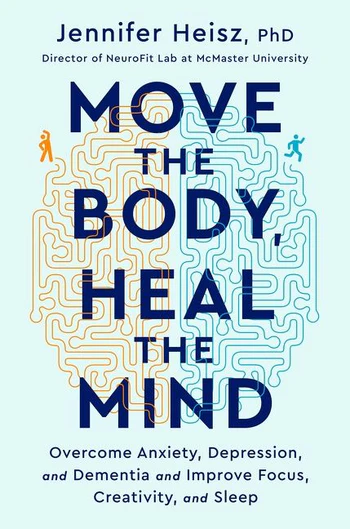When we think about the benefits of exercise, we tend to think of what it does for our body, making us leaner, stronger, and healthier. But my guest is out to emphasize the powerful effect physical activity has on our brains too, and just how much our bodies and minds are connected. Dr. Jennifer Heisz is a professor, the director of the NeuroFit Lab which studies the effects of exercise on brain health, and the author of Move the Body, Heal the Mind. Today on the show, Jennifer and I first discuss how physical activity can help treat mental disorders. She shares the way that low to moderate intensity exercise can mitigate anxiety, and how short bouts of intense exercise can be used as exposure therapy for treating panic disorders. We also talk about the phenomenon of inflammation-induced depression, and how exercise can alleviate it. And Jennifer shares how exercise can strengthen someone's attempt at sobriety, as well as prevent addiction in the first place. From there, we turn to the way exercise can not only mitigate mental maladies but actually optimize the mind. Jennifer shares how physical activity fights aging, and can enhance your focus and creativity. We discuss how exercise can improve your sleep, how it can be used to shift your circadian clock, and whether it's okay to work out close to your bedtime.
When we think about the benefits of exercise, we tend to think of what it does for our body, making us leaner, stronger, and healthier. But my guest is out to emphasize the powerful effect physical activity has on our brains too, and just how much our bodies and minds are connected.
Dr. Jennifer Heisz is a professor, the director of the NeuroFit Lab which studies the effects of exercise on brain health, and the author of Move the Body, Heal the Mind. Today on the show, Jennifer and I first discuss how physical activity can help treat mental disorders. She shares the way that low to moderate intensity exercise can mitigate anxiety, and how short bouts of intense exercise can be used as exposure therapy for treating panic disorders. We also talk about the phenomenon of inflammation-induced depression, and how exercise can alleviate it. And Jennifer shares how exercise can strengthen someone's attempt at sobriety, as well as prevent addiction in the first place. From there, we turn to the way exercise can not only mitigate mental maladies but actually optimize the mind. Jennifer shares how physical activity fights aging, and can enhance your focus and creativity. We discuss how exercise can improve your sleep, how it can be used to shift your circadian clock, and whether it's okay to work out close to your bedtime.
